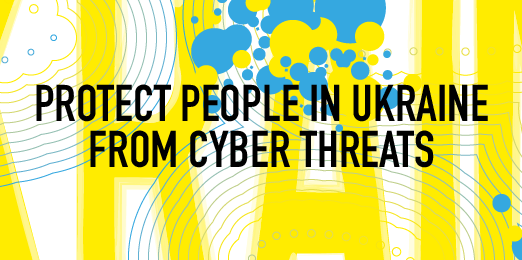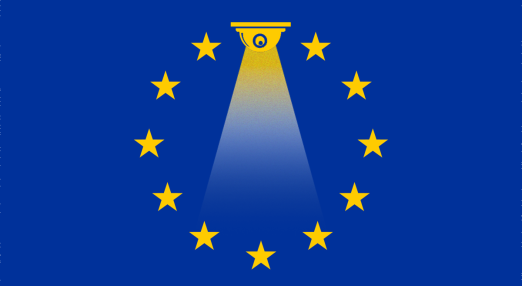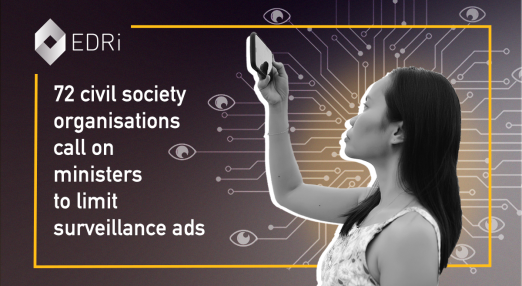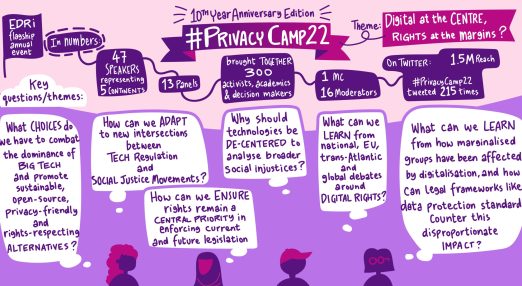Privacy and data protection
Privacy and data protection are essential for us to live, connect, work, create, organise and more. Governments and companies have long used mass surveillance for control trying to legitimise snooping for health, security or other reasons. The near-total digitisation of our lives has made it easier to control, profile and profit from our attention, data, bodies and behaviours in ways that are very difficult for us to understand and challenge. European data protection standards such as the GDPR are a good step forward but we need more to effectively ensure enforcement and protection against unlawful surveillance practices.
Filter resources
-

Cyberattacks on Ukraine’s infrastructure and civil society violate human rights
Alongside Russia’s eight years of armed aggression against Ukraine and its ongoing threats of large-scale invasion, cyberattacks on Ukraine’s critical infrastructure and civilian services are putting people’s human rights at risk. We call on the international community to provide the necessary support to Ukraine and its human rights defenders to ensure people are protected from cyber threats.
Read more
-

The EU AI Act and fundamental rights: Updates on the political process
The negotiations of the EU’s Artificial Intelligence Act (AIA) are finally taking shape. With lead negotiators named, the publication of Council compromises, and the formation of civil society coalitions on the AIA, 2022 will be an important year for the regulation of AI systems.
Read more
-

Building the biometric state: Police powers and discrimination
This report examines the development and deployment of biometric identification technologies by police and border forces in Europe, and warns that the increasing use of the technology is likely to exacerbate existing problems with racist policing and ethnic profiling.
Read more
-

The European Commission does not sufficiently understand the need for better AI law
The Dutch Senate shares the concerns Bits of Freedom has about the Artificial Intelligence Act and wrote a letter to the European Commission about the need to better protect people from harmful uses of AI such as through biometric surveillance. The Commission has given a response to this which is not exactly reassuring.
Read more
-

Guides to collect your data from Apps
EDRi's member Privacy International has devised a series of guides in order to help you collect your data from various platforms such as Uber, Facebook, Telegram and WhatsApp. All of these platforms store a lot of information about you in the cloud, which could become accessible to law enforcement agencies.
Read more
-

Open Letter: Abolish manipulative dark patterns and creepy online ads, ask 72 civil society organisations
Ahead of the upcoming Digital Services Act (DSA) trilogue meeting on 15 March, EDRi, Liberties and Amnesty International and 69 other civil society organisations have sent a joint open letter to 20 ministers and state secretaries in 9 EU Member States. On Tuesday 1.03.2022, several organisations in the Netherlands, Denmark, Germany, France, Spain, Italy, Luxembourg, Austria, Croatia delivered the letter to relevant decisionmakers responsible for their country's position in the EU negotiations.
Read more
-

Civil society calls on the EU to ban predictive AI systems in policing and criminal justice in the AI Act
40+ civil society organisations, led by Fair Trials and European Digital Rights (EDRi) are calling on the EU to ban predictive systems in policing and criminal justice in the Artificial Intelligence Act (AIA).
Read more
-

EDRi-gram, 16 February 2022
In this edition of the EDRi-gram, we put EDRi's affiliate ECNL in the spotlight to take a peek at the fights they are fighting to advance our freedoms online and offline. We're also looking at a comparison between the Western Balkans countries' digital advancement and what the digitalisation of all aspects of life mean citizens' well-being. We're also exploring the Belgian authority's decision that IAB Europe’s consent pop-ups are incompatible with the GDPR, which has been confirmed by 27 data protection authorities from 20 EU countries involved in the cross-border investigation.
Read more
-

ID-Fingerprint obligation to be reviewed by European Court of Justice
The local Administrative Court of Wiesbaden (Hesse, Germany), where EDRi member Digitalcourage started legal action against the obligation for fingerprints in identity (ID) cards, submited the case to the European Court of Justice (ECJ).
Read more
-

CJEU Advocate General states that PNR Directive does not violate fundamental rights despite mass surveillance concerns from civil society
On 27 January, despite concerns from civil society and the CJEU having decided that the EU-Canada PNR agreement was incompatible in 2017, the Advocate General of the Court of Justice of the European Union stated that the EU Passenger Name Record (PNR) Directive was compatible with fundamental rights.
Read more
-

#PrivacyCamp22: Event Summary
The theme of the 10th-anniversary edition of Privacy Camp was "Digital at the centre, rights at the margins" and included thirteen sessions on a variety of topics. The event was attended by 300 people. If you missed the event or want a reminder of what happened in a session, find the session summaries and video recordings below.
Read more
-

Declaration of Digital Principles: Towards a digital pillar of the EU?
On 26 January the European Commission proposed a Declaration on European Digital Rights and Principles. The Declaration will take the form of a joint solemn declaration to be signed by the European Parliament, the Council, and the Commission.
Read more
